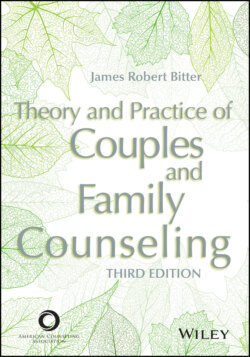Читать книгу Theory and Practice of Couples and Family Counseling - James Robert Bitter - Страница 60
Albert Ellis, Aaron Beck, and the Development of Cognitive Approaches
ОглавлениеAlbert Ellis (2009) was raised in a family headed by distant, detached, and often crazy parents. The oldest child in a Jewish family, he took over, getting himself and his siblings ready and off to school, sometimes feeding them, and generally looking out for their welfare. Because he was often confronted by irrational adults, he had an early interest in what constituted rational thought. But he was also shy and had an early fear of speaking in public.
Ellis tried his luck in business and in writing fiction, but with no success. He did learn to effectively write nonfiction and wrote some early pieces on human sexuality. Eventually Ellis would enter Columbia University in New York City and complete a master’s degree and doctorate in clinical psychology. He trained to be a psychoanalyst with Hermann Rorschach and for a while showed a real interest in Freud. By 1955, however, he had lost faith in psychoanalysis and became impatient with the lack of results. He developed the first directive model based on substituting rational for irrational thought, calling his approach rational therapy.
Still, people did not present for counseling saying that they had problems with their thinking. They came with feelings of anxiety, depression, fear, panic, worry, anger, and so on. When Ellis would ask people why they felt one way or another, they would often relate it to an activating event, believing that the event caused their feeling. Ellis would challenge this assertion, saying that it was not the event that caused the feeling but the beliefs or thoughts the person had about the event. Every negative feeling (C) is the result of an irrational belief (B) in relation to the activating event (A). Ellis also noted that there was always a B1 and a B2 option in his ABC process. The former was a rational belief that would result in still functional feeling states, and the latter was an irrational belief that would result in disturbing feelings and often dysfunctional behavior. Thus, if the person I am dating breaks up with me (A), and I think that this is the worst, most horrible thing that could happen to me (B2), I will wind up feeling depressed (C). However, if I think that it is unfortunate that this person and I did not work out (B1), I will probably be sad for a while, but life will go on.
Aaron Beck graduated from Brown University and later Yale Medical School at about the same time that Ellis was completing his degrees in clinical psychology. Like Ellis, Beck was initially trained in psychoanalysis, and he set out to study its tenets in relation to people who were depressed and anxious. His studies did nothing to confirm psychoanalysis; rather, they led to an identification of what Beck called automatic thoughts, essentially negative thoughts that people have about themselves, the world, or the future. Beck (1997) noted that people would accept these thoughts as both valid and normal, thoughts they had had all of their lives and that had never been challenged. Beck began to help his patients identify and evaluate these thoughts, to challenge them through thinking more realistically; in doing so, his patients would also report feeling better emotionally and even behaving more functionally. Beck came to believe that cognitive distortions, which he categorized and specified, always had negative effects on behavior, no matter what the disorder. It is for this reason that Beck is considered by many to be the father of cognitive behavior therapy.
In the late 1980s, Beck and colleagues began to address the cognitive schema that were involved in marital discord, and Beck (1988) even went so far as to write a popular book, Love Is Never Enough, to bring cognitive behavioral ideas to those who might be having difficulties in their coupled or spousal relationships.
Beck was always less abrasive than Ellis, and his work found much less resistance among medical and nonmedical professionals when it was introduced. To be sure, his distinguished work at the University of Pennsylvania was based on solid research, and his ideas influenced many important contributors to cognitive therapy, including Martin Seligman, who would develop the concept of learned helplessness. Beck’s careful development of the model and instruments of assessment made it hard to argue with his outcomes. In the field of psychotherapy, Beck’s cognitive behavioral approach is now the most researched method of counseling: It is the model to which most people refer when they are concerned about evidence-based practice.
Beck’s daughter, Judith Beck, would also join her father in developing the model and creating the Beck inventories for depression, hopelessness, and anxiety for both adults and youth. Today Judith Beck is the president of the Beck Institute near Philadelphia, an institute she and her father started in 1994.
